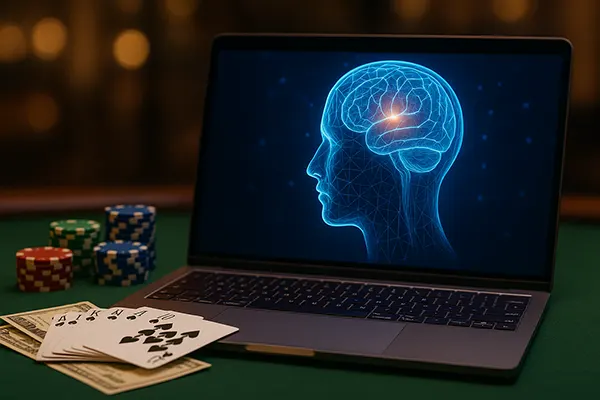
How LLMs and AI Are Changing Poker: Multi-Way Play Through the Lens of SpinGPT
Poker, a game that has always balanced logic, psychology, and probability, is undergoing a transformation fuelled by artificial intelligence and large language models (LLMs). The emergence of tools like SpinGPT represents not only a technological breakthrough but also a redefinition of strategic decision-making in multi-way games where multiple players compete for the pot. By integrating advanced AI analysis with real-world gameplay, poker strategies in 2025 are becoming more data-driven and adaptable than ever before.
The Role of LLMs in Modern Poker Strategy
Large language models, trained on vast datasets of poker hands, mathematical models, and human behaviour, can now identify complex strategic patterns that were previously invisible to even the most skilled professionals. Unlike traditional solvers, which operate on fixed assumptions, LLMs analyse context, narrative flow, and behavioural dynamics in real time, providing a multi-dimensional perspective on the game.
SpinGPT is an example of how this technology reshapes poker learning. It goes beyond probability calculations, interpreting betting patterns, psychological pressure points, and even linguistic cues during live commentary or player chat. This hybrid between linguistic and statistical intelligence helps both amateurs and professionals refine their tactics in multi-way pots, where the dynamics are fluid and unpredictable.
Another crucial factor is that LLMs adapt to meta-game trends. As online poker evolves, SpinGPT monitors collective player behaviour, recognises emerging strategies, and simulates counter-strategies. This feedback loop transforms static knowledge into evolving insight, keeping players at the cutting edge of competition.
SpinGPT and Predictive Decision-Making
What distinguishes SpinGPT from earlier AI poker systems is its capacity to model uncertainty. While earlier algorithms such as Libratus or Pluribus excelled in heads-up or limited scenarios, SpinGPT thrives in multi-way play, where multiple decisions interact dynamically. It uses reinforcement learning and natural language interpretation to anticipate opponent reactions in open-ended contexts.
For example, SpinGPT can simulate the impact of an aggressive raise in a five-handed pot, predicting not only the expected value of each decision but also the psychological responses of specific player archetypes. It translates complex simulations into human-readable insights, allowing players to make informed choices within seconds.
This predictive layer transforms poker into an interplay of probabilities and psychology. By combining the processing power of AI with human intuition, SpinGPT enhances the strategic experience rather than replacing it.
AI-Enhanced Training and Player Development
One of the most significant contributions of AI to poker in 2025 lies in education and skill development. LLM-powered systems provide personalised coaching, analysing a player’s style, decision-making biases, and emotional triggers. Instead of static lessons, learners receive adaptive guidance that evolves with their progress and playing environment.
SpinGPT, for instance, can identify habitual mistakes in multi-way pots — such as overvaluing marginal hands or misjudging position-based leverage — and offer corrective strategies supported by mathematical reasoning. The tool is not limited to providing solutions; it encourages players to understand why certain moves are optimal under specific game conditions.
Furthermore, LLM-driven environments are fostering collaborative learning communities. Players can discuss hand histories and strategic dilemmas with AI-assisted moderation, ensuring that the discourse remains accurate, educational, and data-backed. This promotes not just individual improvement but collective knowledge growth across poker communities.
Bridging Human Experience and Machine Insight
While artificial intelligence can analyse millions of scenarios per second, the essence of poker remains human. SpinGPT recognises this by framing its recommendations as context-dependent, acknowledging elements like fatigue, tilt, and intuition that pure mathematics cannot quantify. This balance between computational precision and human adaptability defines the future of poker learning.
Many top professionals are already incorporating SpinGPT into their preparation routines. They use its predictive models to test hypothetical strategies and evaluate decision-making under pressure. The AI effectively serves as both an opponent and a mentor, replicating complex multi-way situations that rarely occur in standard training environments.
As a result, poker education in 2025 is more immersive and personalised. The integration of LLMs into coaching platforms signals a shift from memorisation to true comprehension — a move towards strategic intelligence that mirrors real tournament conditions.

The Future of Multi-Way Poker Through AI Evolution
Multi-way pots have always represented the most challenging form of poker due to their mathematical depth and psychological uncertainty. With the adoption of LLM-based tools, these complexities are now quantifiable. SpinGPT processes historical data and live gameplay simultaneously, delivering actionable insight that adjusts in real time.
Moreover, as AI models become more explainable, transparency in strategy-building increases. Players no longer treat AI recommendations as black boxes; instead, they understand the reasoning behind each move. This transparency strengthens trust in AI-driven systems and aligns with the ethical standards promoted across the online poker industry.
Finally, the integration of SpinGPT and similar technologies indicates a future where AI is not a competitor but a collaborator. The goal is to refine human judgment, reduce error margins, and expand the intellectual depth of the game. Poker in 2025 stands as a testament to how artificial intelligence, when properly aligned with human experience, can elevate strategy to unprecedented levels.
Ethics, Regulation, and Responsible Innovation
The rapid integration of AI into poker has prompted regulatory bodies and developers to address ethical challenges. Transparency about AI-assisted decision-making and responsible gameplay are now integral components of online poker policies. SpinGPT’s creators prioritise user integrity, ensuring the system enhances rather than exploits the player experience.
As machine learning continues to evolve, it is crucial to maintain fairness and prevent misuse. Developers are collaborating with gaming authorities to implement monitoring protocols that detect AI-driven unfair advantages, preserving the integrity of the competitive environment.
Ultimately, the partnership between technology and regulation defines the sustainable future of poker. By balancing innovation with accountability, SpinGPT and similar tools exemplify how AI can enrich gaming without compromising ethics or authenticity.
The most popular articles
-
 Side Bets in Baccarat: A 3-Step Sanity Fil...
Side Bets in Baccarat: A 3-Step Sanity Fil...Side bets in baccarat are marketed as small add-ons, yet in practice …
-
 Blackjack Surrender Rule: When Giving Up I...
Blackjack Surrender Rule: When Giving Up I...Surrender is one of the most misunderstood options in blackjack because it …
-
 Shuffle machines and continuous shuffling ...
Shuffle machines and continuous shuffling ...Blackjack looks like a simple game of 21, but what happens before …
